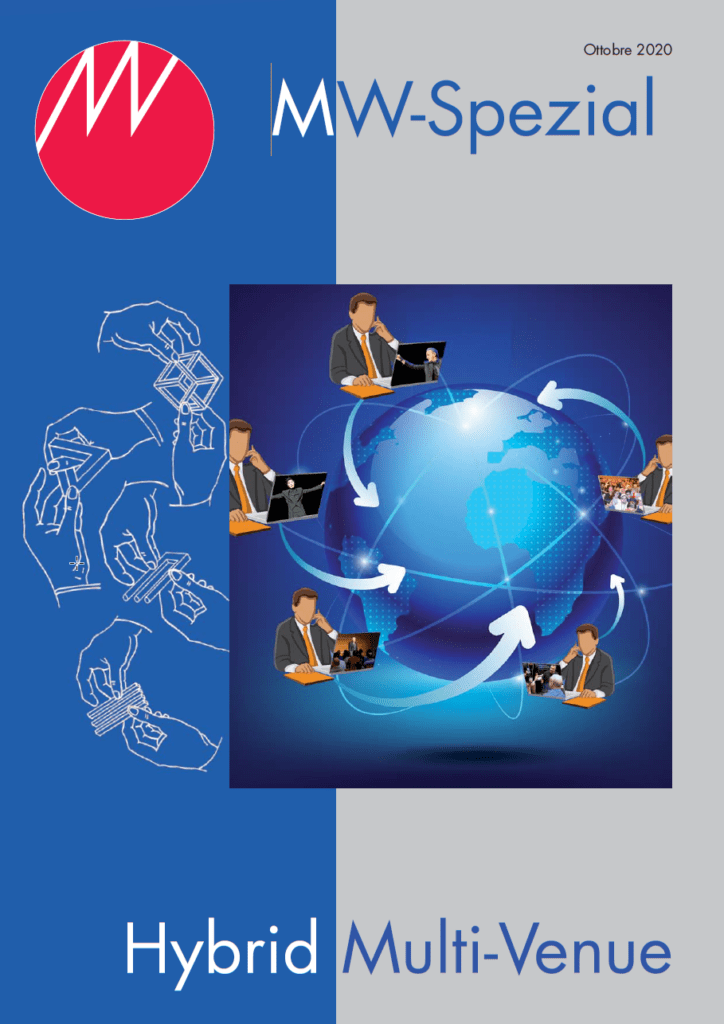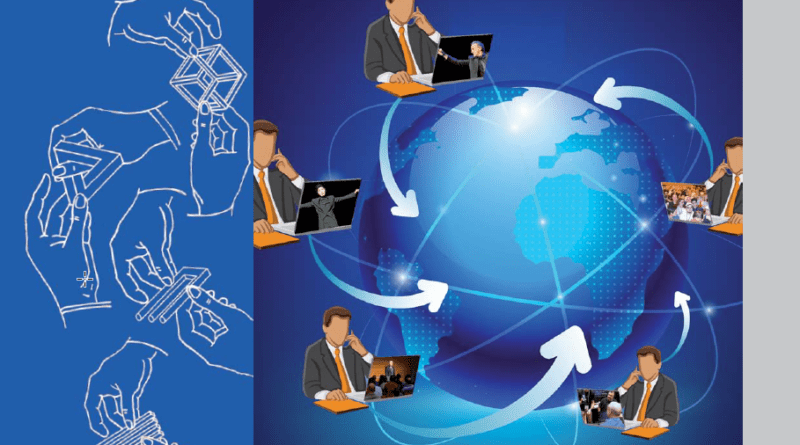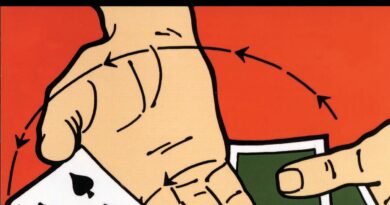Re-calibrating the FISM World Championships of Magic by Eric Eswin
Is it time to re-think magic competitions and conventions? Eric Eswin give us some ideas about the future of Magic. Download the PDF file here.
Covid-19 for magic means that we are forced to re-calibrate our familiar structures and meetings and see what changes result from them. By now we should know and accept that it is not a matter of temporary change after which the old habits of the pre-Corona period could be picked up again. Many magicians have been extremely creative in coming up with other ways in which the art of magic could still be practiced, taking care of all restrictions, such as keeping distance, staying away from mass events, maximum numbers of people in theatres, at gatherings, etc. Web conferences via Zoom, Google Meet, Microsoft Team, Skype, and the like were used on a large scale. Clubs organized online conventions and both professional and amateur magicians turned to the internet with presentations, lectures, and masterclasses. It is striking to note that up till now everyone has gone their own way. In general, there was a lack of cooperation and coordination. Let alone support and control by the umbrella organization in magic, the FISM.
After initial denial and hesitation, national and international conventions, including the FISM World Champion – ships, were postponed by one year. More than the notification of the postponement was often not given. There was little or no expectation about what the event would look like in a year’s time. Obviously, the implicit thought was that the situation would then be more or less “as before” and manageable. Gradually, however, the idea began to take hold that the post-Corona era could be different from the pre-Corona period due to social, economic, financial, and behavioural changes. “Temporary” changes may well become permanent changes. But what exactly are these changes? Because no one knows for sure how the virus will develop and how to respond to it, we are gradually moving from pre-Corona to post-Corona, without having the final goal in sight and even without knowing when a final goal will be achieved. In such a case it is difficult to find the right way. It is unwise to assume just one “expected future”, which then serves as the basis for a new vision, strategy, and design.
Even during a recalibration, there must be room to gradually take other paths or to incorporate other possibilities. After all, a future does not depend solely on time, but also on the way in which it is influenced by human actions. In a way we can contribute to shaping the future. In this article an outline will be given of an online FISM World Championship of Magic, using the HYBRID MULTI-VENUE platform. This platform is not yet widely used in magic, while it is ideally suited for an international convention or competition. In the events industry, it is considered the closest method to face-to-face interaction. The concept of a „HYBRID MULTI-VENUE platform” is that groups of magicians participate in a magic event at the same time at different (international) locations. At different venues everyone takes part in e.g. a FISM World Championship of Magic, at the same time, either as a competitor or as a spectator. The size of the groups can be different in all venues and can include hundreds of people.
Every participant is seen and, if necessary, heard, by everyone at every venue. The shared experience creates a feeling of togetherness between the participants at the different venues. Compared to a home webcast, a multivenue approach is much more fun. At home you are easily distracted, and it is difficult to keep concentrating. In a multi-venue situation you experience the event with others and networking is also more stimulated, all the more because the event is hybrid and thus can also be streamed live, so that others than the attendees can also experience it online. At home the technical setup is mostly amateurish. A HYBRID MULTI-VENUE championship does require an absolute full professional expertise and cannot be left to amateurs. In order to experience a little bit of the atmosphere and feeling of a FISM HYBRID MULTI-VENUE WORLD CHAMPIONSHIPS OF MAGIC, imagine the following:
You live in Paris and you wanted to join the first digital online FISM World Championships of Magic. So you paid a subscription fee of 150 Canadian Dollars (about e 100,– or US$ 117,–) to the organizers and on the announced date you go to a big hall in Paris, which was set up like a theatre with full stage facilities. There was also a huge television screen and a lot of cameras, sound systems and other technical equipment. You meet with some 100 magic friends. From a corner of your eyes you see Norbert Ferré joking with Serge Odin, the President of the FFAP. You begin to realize that you are participating in person in the Paris-venue of the first FISM HYBRID MULTI-VENUE WORLD CHAMPIONSHIPS OF MAGIC. Further venues are in Melbourne, Cape- Town, Tokyo, Buenos Aires, and the host venue is settled in Quebec, Canada. Each venue represents a continent. It is a hybrid event because apart from the in-person participants in the six venues, magicians from all over the world could join the event online from their home. The cost for online participation for two days is a mere 50 CAD.
Much cheaper than the entrance fee for a live or in-person participation in one of the venues. But then as an online subscriber you cannot interact with the venues. But you can write your comments and share these directly with all other online viewers. On the big screen you see the Paris-venue completely displayed and you see the images of the other venues around it. In Tokyo, Hiro Sakai is performing a new card trick. At least that is what he thinks. You know that the trick is an old one and is the brainchild of Masatoshi Furota. You intend to tell him later during one of the breakouts. A few minutes before noon, Serge Odin steps forward, welcomes the Paris-group and announces that shortly, the Host- Quebec- venue will take over and the first FISM HYBRID MULTI-VENUE WORLD CHAMPIONSHIPS OF MAGIC will be opened by its President. As it is the first hybrid online World Championships, the program is concentrated on the competition. No dealer exhibition, lectures or social dinners are scheduled. If time permits a show of Jeff McBride is an anticipated option.
The Championships will last for two days and for Europe the timeframe will be from 12:00 o’clock midday till 7 o’clock in the evening. Because of the time differences, these times will vary amongst the other venues. For the Buenos-Aires venue e.g. the timeframe is from 7 in the morning till 2 in the afternoon, while the Tokyo-venue is participating from 7 o’clock in the evening till 2 o’clock the next morning.
After the welcoming speech from the President in Quebec and a short show with some members of the Canadian Association of Magicians, the competition started. There are 38 competitors for the Stage competition and 20 Close-up contestants. All competitors have been carefully selected during preceding continental championships. The selected competitors are the best of each continent. They do not have to travel to Quebec, but are either performing from their own venue, or have previously sent a video of their act to Quebec. The video must be authorized by the President of their national magic club. All performances are judged by a jury committee of 7 persons. The Jury-president and one other judge is at the Quebec venue. Each other venue hosts 1 jury member. They judge according to slightly adapted Competition rules, in line with the new concept. After the welcoming speech of the Quebec President, the first competitor in the category General Magic, the Canadian magician David Starr, performs live at the stage in Quebec. His performance is seen by all participants in all venues. His performance stirs quite some audience reaction.
He gets a lot of applause from all venues ……. especially when he is caught on a well-executed steal that, however, was supposed to be invisible. After his performance the judges fill out their judging form and sent it digitally to the Jury president in Quebec, who immediately enters it in a sophisticated digital summary program. The next contestant, Shigeru Yamamoto, performs his manipulation act from the Tokyo-venue and he also managed to attract a lot of support from the public. At the end he received a standing ovation from all venues. After some 9 contestants the moderator in Quebec announces an intermission, which is called a ‘Breakout’ in the online business. During that time every venue can do whatever they like. They can have a coffee or tea, stretch their legs, or show a friend a trick. Everyone in every venue remains visible on the screen, but the sound is off. So, you may see Tamariz performing in the Buenos Aires-venue, but you can’t hear his “shuffle- shuffle-shuffle” while asking someone to destroy the order of the cards. During a breakout a venue can ask the technicians to connect them with another venue. After the breakout the competition proceeds with the Australian magician Peter Ellis.
The Melbourne-venue has not been able to set up a theatre and therefore a video of Peter’s Illusion act was presented. The audience screamed when Peter concluded with an amazing production of a live tiger. In such a way all stage competitors shared their enthusiasm and comments with the other in-person participants in all venues. And this kind of interaction continued in the 15 minutes breakouts. At 1 pm Quebec time (19:00 hrs local European time), the first day of the FISM HYBRID MULTI-VENUE WORLD CHAMPIONSHIPS OF MAGIC was closed by its President in Quebec, reminding everyone to be on time the next morning for the continuation of the Magic Championships. Day Two The next day started at the same time as the day before. Now it was Close-up time. 20 Selected international close-up magicians were ready to compete for the prestigious FISM TROPHY. The Close-up competition, also with a lot of interactive communications between the in-person participants, ends after some 4 hours. After another breakout the Quebec-venue presented a special show composed and directed by Canadian magician Greg Frewin. At the same time, the jury had its joint deliberations via a special online meeting. After the special magic show, the Awarding of the Prizes Ceremony took place.
According to the adapted Competition rules, there were a first and a second prize in each category and there was an overall Champion, who received the prestigious FISM GRAND PRIX trophy. After all the winners were enthusiastically congratulated and the usual excited opinions about the results of the jury had faded, all venues erupted in community singing of Frank Wilson’s composition “Magic all over the world”. It was a happy and dignified ending to the very first FISM HYBRID MULTI-VENUE WORLD CHAMPIONSHIPS OF MAGIC.
The proposed World Championships are based on two fundamentally different starting points, compared to the current concept of the FISM World Championships. First there is the Multi-venue component. There is not just one city where it all takes place, but the championships are spread over 6 cities in six continents. Secondly, the Hybrid component: it is not just a face-to-face event for 2000 or 3000 magicians, but a face-to-face event for a few hundred magicians located in different cities PLUS a streamed online event for thousands of magicians who can experience the world championships from anywhere on their local screen. The number of these online viewers are not to be underestimated. Some YouTube magicians have as many as 1,000 to more than 300,000 followers.
These are all potential participants in the hybrid multi-venture world championships. These two components are at the core of the recalibration of the FISM World Championships of Magic. Pros and Cons It is correct that in the new concept there is no all-over face-to-face interaction. It is also true that personal interaction is extremely important for magic performances. Every magician can fully confirm this from his own experience. But in the current circumstances (which can go on for an unprecedented time) this complete face-to-face interaction is not or not completely possible. That is an extremely unfortunate fact, but there is little that can be done about it. Hence the Hybrid Multi-venue format. In the meeting industry, the concept of hybrid multi-venue events is seen as an event that comes closest to a face-to-face interaction. In the business world the hybrid multivenue concept is used more and more. Still little or not at all in the entertainment industry. Time for the magic world to take a first step. The hybrid multi-venue championships outlined above is not the ultimate. It is just ONE of the ways a FISM HYBRID MULTI-VENUE WORLD CHAMPIONSHIPS OF MAGIC could be organized. Neither is it meant as a full replacement of the world championships as we know them till today.
It is just an addition to the arsenal of organizational models, to be used when circumstances require. For the moment the Coronavirus fully justifies a hybrid multi-venue approach. Further Thoughts The proposed model is a basic framework that needs further detailing and within which various adjustments are possible. For example, “only” 38 theatrical and 20 close-up acts have been assumed. This was done to have as many acts as possible of a maximum of 10 minutes duration (in accordance with FISM rules) perform within 7 hours a day. If there is a need for more competitors, this can be done either by increasing the number of days or by limiting the duration of an act to, for example, 6 or 7 minutes. And why should a competition day only last 7 hours? Can’t it last longer? Actually, 7 hours is already too long. The Melbourne-venue (15 hours time difference with Quebec) would then last from 9 p.m. until 4 a.m. the next morning! And also, in Tokyo one would have to stay awake until 2 a.m. the next day. In the events industry, it is believed that a time difference of 12 hours is the maximum for a simultaneous experience by all participants on all continents. But ways can be devised to mitigate this drawback of large time differences. There are many more things that require further reflection and elaboration.
National and international Corona rules must be considered, like a maximum number of people per venue. A new business plan must be designed; new forms of governance must be explored; the relationship with site owners must be reviewed; etc. etc. And it should also not be done in isolation. Urgent support and advice are needed from professional meeting designers or meeting innovators, who have experience with hybrid multi-venue meetings and congresses. In Private Years ago, I attended lectures of the Belgian professor Roger de Bruyn, of the University of Antwerp on “Creative Thinking”. He explained that to stimulate creative thinking, you only have to ask just two questions: “What if ……? “ and “How else?“. Answers to these questions may not always immediately provide the right solutions for a concrete problem, but they do open new ways that can lead to it.
In this contribution I have tried to answer the questions: “What if the Corona crisis lasts longer and brings lasting changes?” and “How else could we organize the FISM World Championships?” It is extremely easy to react negatively to the Hybrid multi-venue concept and to list the reasons why the FISM World Championships are not suitable for such an approach.
After all, most obstacles are not difficult to come up with. Repeating them and hoping for the return of pre-Corona time will undoubtedly lead to severe disappointment. Waiting patiently and hoping are no options. The intention of this article is therefore not to list all the disadvantages and impossibilities. It is, however, about looking first and foremost at what good, fun, new and inspiring possibilities the new concept offers and how we can implement them. This article is of course also offered to the members of the General Assembly of the FISM and its Board of Directors. May it be a help and a stimulus for a quick implementation of a new strategic plan. Corona has forced us to think about a recalibration.
It is up to all of us to take action and ensure that we can quickly enjoy the very first FISM HYBRID MULTI-VENUE WORLD CHAMPIONSHIPS OF MAGIC. Preferably in 2022.
By Eric Eswin
Eric Eswin significantly changed the FISM in 2006 with the implementation of the continental divisions. Now, 14 years later, he presents a strategic plan for the FISM World Championships during Corona circumstances.





